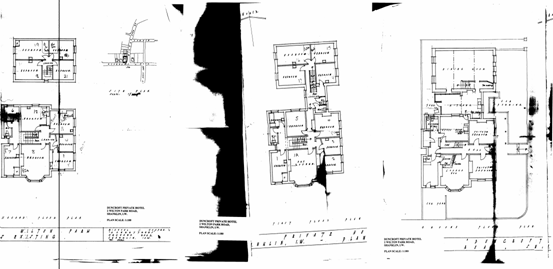PAPER B
Purpose: For Decision
Committee: LICENSING (DETERMINATIONS)
SUB COMMITTEE
Date: 2 MAY 2007
Title: APPLICATION
FOR THE REVIEW OF A PREMISES LICENCE FOR THE DUNCROFT HOTEL (WIGHT RABBIT BAR),
2 WILTON PARK ROAD
REPORT
OF THE HEAD OF CONSUMER PROTECTION
1.
SUMMARY/PURPOSE
To
determine an application made by the police under section 51 of the Licensing
Act 2003 to review the premises licence for the Duncroft Hotel, (also known as
the Wight Rabbit), 2 Wilton Park Road, Shanklin, IW.
2.
BACKGROUND
The mechanism to review a premises licence
exists to protect the community where problems associated with crime and
disorder, public safety, public nuisance or the protection of children from
harm are occurring at a premise for which a premises licence has been granted
under the Licensing Act 2003.
At any stage, following the grant of a
premises licence, a responsible authority, such as the police or the fire
authority, or an interested party, such as a resident living in the vicinity of
the premises, may ask the
Licensing authorities may not initiate their
own reviews of premises licences. Officers of the local authority who are
specified as responsible authorities under the 2003 Act, such as environmental
health officers, may however request reviews on any matter which relates to the
promotion of one or more of the
3.
DETAILS OF THE APPLICATION
This application is for a
review of a Premises Licence under Section 51 of the Licensing Act 2003
(Appendix 1)
|
Applicant Name and
Address |
Chief Superintendent
Morgan Police Station High Street |
|
Premises Being Reviewed |
Duncroft Hotel (Wight
Rabbit Bar) Shanklin, |
|
Licence Holder |
Ms Gillian Mary Tobin |
Section 51 has been complied with in terms of
service of the application and notification to other responsible authorities,
and notices containing all relevant information have been displayed for the
required 28 day period at the Duncroft Hotel, at the offices of the Council at
Jubilee Stores, The Quay,
The Police have stated the following as the grounds
for review:
The Prevention of Crime & Disorder
|
Prevention of Public Nuisance
|
Protection of Children from Harm
|
The police have supplied supporting statements from
local residents which are attached at Appendix 2.
The police recommend that the licence is revoked as
their record shows that its holder has scant regard for the
If the licence is not entirely revoked, the police
recommend that live and recorded music and dancing are removed from the
licence, in addition;
- The use of the bar to end at 2230 hours for the sale of alcohol
- The bar to be closed to non-residents
- The use of the bar for bona-fide (persons having at least one main
meal supplied on the premises) hotel residents only, but not guests of
residents, and only until 2230hrs
- No persons under 18 to be present in the room where the bar is
located
- No person under 18 to be employed on the premises for the sale of
alcohol, or concerned in its delivery whether for payment or otherwise.
4.
LOCATION
AND SITE CHARACTERISTICS
|
The Duncroft Hotel is a
hotel with a bar (known as the Wight Rabbit) and separate dining room situated
on the corner of Wilton Park Road and Atherley Road in Shanklin. It is
surrounded by mainly residential properties. |
5.
REPRESENTATIONS
THAT ARE RELEVANT TO ONE OR MORE OF THE LICENSING OBJECTIVES
|
Responsible Authorities |
|
|
|
|
|
Environmental
Health Officer |
No
representations |
|
|
|
|
Fire Safety
Officer |
No
representations |
|
|
|
|
Planning Officer |
No
representations |
|
|
|
|
Trading
Standards Service |
Support the
police application for review due to underage sales having taken place on two
occasions, and it is the view of the Service that the DPS has not exercised
adequate control over sales of alcohol to under 18s.(Appendix 3) |
|
|
|
|
Health &
Safety |
No
representations |
|
|
|
|
Children’s
Services |
No
representations |
|
|
|
|
Interested Parties |
No
representations |
|
|
|
6.
LOCAL
POLICY CONSIDERATIONS
It is considered that the
following paragraphs from the Council’s Licensing Authority’s Statement of
Licensing Policy, 2004 to 2007 have a bearing upon the application.
Members’ attention in respect of this particular
application is drawn to:
|
Clause 1 |
Licensing
Objectives |
All paragraphs |
|
Clause 2 |
Introduction |
All paragraphs |
|
Clause 3 |
Integration of
Strategies and Other Legislation |
3.1 to 3.5 3.9 to 3.11 |
|
Clause 4 |
Approach to
Licensing Applications |
4.1 to 4.3 4.5, 4.6 |
|
Clause 6 |
Representation,
Reviews and Appeals |
All paragraphs |
|
Clause 7 |
Enforcement |
All paragraphs |
|
Clause 8 |
Operating
Schedules |
8.1 to 8.2 8.13 to 8.19 |
7.
NATIONAL
GUIDANCE
National guidance regarding
control of areas outside the premises is as follows:
Paragraph 3.11 “The conditions attached to various
authorisations will be focused on matters which are within the control of
individual licensees and others in possession of relevant authorisations. Accordingly, these matters will centre on the
premises being used for licensable activities and the vicinity of those
premises. Whether or not incidents can
be regarded as being “in the vicinity” of licensed premises is a question of
fact and will depend on the particular circumstances of the case.
In addressing this
matter, the
Licensing law is not the
primary mechanism for the general control of nuisance and antisocial behaviour
by individuals once they are away from the licensed premises and, therefore,
beyond the direct control of the individual, club or business holding the
licence, certificate or authorisation concerned. Nonetheless, it is a key aspect of such
control and
National
guidance regarding reviews is as follows:
Paragraph 5.100 “At any stage following the grant of a
premises licence, a responsible authority or an interested party may ask the
Paragraph 5.102 In every case, the representation must relate to particular
premises for which a premises licence is in existence and must be relevant to
the promotion of the
Paragraph 5.103 It is important to recognise that the promotion of the
Paragraph 5.105 Licensing authorities are expected to be aware of the need
to prevent attempts to review licences merely as a second bite of the cherry
following the failure of representations to persuade the
Paragraph 5.106 Following receipt of a request for a review from a
responsible authority or an interested party or in accordance with the closure
procedures described in Part 8 of the 2003 Act, the
National guidance
regarding the powers of a
Paragraph 5.108 “The
Paragraph 5.109 Where the
1. to
modify the conditions of the premises licence (which includes adding new
conditions or any alteration or omission of an existing condition), for example,
by reducing the hours of opening or by requiring door supervisors at particular
times;
2. to exclude
a licensable activity from the scope of the licence, for example, to exclude
the performance of live music or playing of recorded music (where it is not
within the incidental live and recorded music exemption);
3. to remove
the designated premises supervisor, for example, because they consider that the
problems are the result of poor management;
4. to suspend
the licence for a period not exceeding three months;
5. to revoke the
licence.
Paragraph 5.110 In
deciding which of these powers to invoke, it is expected that
Paragraph 5.111 Licensing
authorities should also note that modifications of conditions and exclusions of
licensable activities may be imposed either permanently or for a temporary
period of up to three months. Accordingly temporary changes or suspension of
the licence for up to three months may be imposed. This could impact on the
business holding the licence financially and would only be expected to be
pursued as a necessary means of promoting the
National guidance regarding public nuisance is as
follows:
Paragraph 7.39: “The 2003 Act requires
Paragraph 7.40: Public nuisance is given a statutory meaning in many pieces of legislation. It is however not narrowly defined in the 2003 Act and retains its broad common law meaning for the Act’s purposes. The prevention of public nuisance could therefore include low-level nuisance perhaps affecting a few people living locally as well as major disturbance affecting the whole community. It may also include in appropriate circumstances the reduction of the living and working amenity and environment of interested parties (as defined in the 2003 Act) in the vicinity of licensed premises.
Paragraph 7.41: Conditions relating to noise
nuisance will normally concern steps necessary to control the levels of noise
emanating from premises, from simple mechanisms like ensuring that doors and
windows are kept closed after a particular time in the evening to more
sophisticated mechanisms like sound level inhibitors on amplification equipment
or sound proofing. Any conditions necessary to promote the prevention of public
nuisance should be tailored to the style and characteristics of premises and
the type of activities expected to take place there.
Paragraph 7.42: As with all conditions, it
will be clear that conditions relating to noise nuisance may in certain
circumstances not be necessary where the provisions of the Environmental
Protection Act 1990 and of the Noise Act 1996 adequately protect those living
in the vicinity of the premises in question. But as stated earlier in this
Guidance, the approach of
Paragraph 7.43: Where applications have given
rise to representations, any necessary and appropriate conditions should
normally focus on the most sensitive periods. For example, music noise from
premises usually occurs from mid-evening until either late evening or early
morning when residents in adjacent properties may be attempting to go to sleep
or are sleeping. In certain circumstances, conditions relating to noise may
also prove necessary to address any disturbance anticipated as customers enter
and leave the premises and therefore, in the immediate vicinity of the
premises.”
8.
IMPLICATIONS
UNDER THE HUMAN RIGHTS ACT 1998
Members are advised that this application
must be considered against the background of the implications of the Human
Rights Act 1998.
There are three
convention rights, which need to be considered in this context:
(a)
Article 6 Right to a Fair Trial –
In
the determination of his civil rights and obligations, everyone is entitled to
a fair and public hearing within a reasonable time by an independent and
impartial tribunal established by law.
It
has been held that the fact that there is a right of appeal to the Magistrates’
Court from any decision of the Licensing Authority is sufficient to make the
Council’s
(b)
Article 8 Right to Respect for Private and
Family Life –
Everyone
has the right to respect for his private and family life, his home and his
correspondence. In the case of article 8
there shall be no interference by a public authority with the exercise of this
right except as such in accordance with the law and is necessary on a
democratic society in the interests of national security, public safety or the
economic wellbeing of the country, for the prevention of disorder and crime,
for the protection of health or morals or for the protection of the rights and
freedoms of others.
(c)
Article 1 of the First Protocol Protection
of Property –
Every
natural or legal person is entitled to the peaceful enjoyment of his
possessions. In the case of Article 1 of the first protocol it states that “no
one shall be deprived of his possessions except in the public interest and subject
to the conditions provided for by law and the general principles of
international law. The preceding
provisions (of which articles 6 and 8 are but two) shall not however in any way
impair the right of the state to enforce such laws as it deems necessary to
control the use of the property in accordance with general interest or to
secure the payment of taxes or other contributions or penalties”.
A licence is viewed as a
possession thus making Article 1 relevant in this case.
The Licensing Authority acknowledges the
right of business in its area to operate, but equally acknowledges the fact
that this must be balanced against the rights of residents not to be disturbed
by unreasonable noise and nuisance caused by licensed premises. The Licensing Authority must ensure that the
reasons given for any interference with these rights are necessary and proportionate
and in accordance with the Council’s legitimate aim, in this instance promoting
the
9.
OBSERVATIONS
The Licensing (Determinations) Sub-Committee
is obliged to determine this application with a view to promoting the
·
The prevention of crime and disorder
·
Public safety
·
The prevention of public nuisance
·
The protection of children from harm
In making its decision, the Licensing (Determinations)
Sub-Committee is also obliged to have regard to national guidance and the
Council’s own Licensing Policy.
The Licensing
(Determinations) Sub-Committee must also have regard to all of the
representations made and the evidence it hears.
The Licensing (Determinations)
Sub-Committee must take such of the following steps (if any) as it considers
necessary for the promotion of the
1. to modify the conditions of the licence.
2. to exclude a licensable activity from the scope of the
licence
3. to remove the designated premises supervisor
4. to suspend the licence for a period not exceeding three
months
5. to revoke the licence
The Licensing (Determinations)
Sub-Committee is asked to note that it may not take the above steps merely
because it considers it desirable to do so.
It must actually be necessary in order to promote the
10.
APPENDICES
ATTACHED
Appendix
1 - Application for review
Appendix
2 – Supporting statements from local residents
Appendix
3 – Trading Standards representation
Appendix
4 - Duncroft Hotel’s Premises Licence
11. BACKGROUND PAPERS
Minutes
of the Licensing (Determinations) Sub-Committee held in Committee Room 1, County
Hall,
12. ADDITIONAL INFORMATION
The Premises Licence (Appendix
4) shows:
|
Designated Premises Supervisor |
Gillian Tobin |
|
Provision of Regulated Entertainment |
Hours of Licensable Activities |
|
|
|
|
Live Music (on not more
than 15 occasions per year) |
All days 1000hrs to 2400hrs |
|
Recorded music |
Mon to Sat 1000hrs
to 2400hrs Sunday 1200hrs
to 2300hrs (2400hrs when one of the 15 occasions with live music) |
|
Performances of Dance |
Mon to Sat 1000hrs
to 2400hrs Sunday 1200hrs
to 2300hrs (2400hrs when one of the 15 occasions with live music) |
|
Supply of Alcohol |
All Days 1000hrs to 2400hrs 24 hrs for residents only |
|
Opening Hours of Premises |
All Days 1000hrs to 2400hrs 24 hrs for residents only |
|
Non Standard Timings |
N/A |
Conditions of the Existing Premises Licence:
|
The
Prevention of Crime & Disorder |
|
Alcohol shall not be consumed in the
outside area of the premises after 2300hrs. Suitable beverages other than
intoxicating liquor (including drinking water) shall be equally available for
consumption with or otherwise as an ancillary to meals served in the licensed
premises. |
|
|
|
The Prevention of Public
Nuisance |
|
No regulated entertainment
shall take place outside. Windows to be closed at
2200hrs during regulated entertainment. Live music to be restricted
to 15 times per year. No regulated entertainment
to take place after 2300hrs on Sundays except in relation to the 15 occasions
during the year referred to in condition above, the applicant to give the |
Prior to the Licensing Act
2003 being implemented, the previous owner of the premises operated it strictly
as a hotel with a liquor licence to sell alcohol to residents only.
When the licence was
transferred to Ms Tobin a variation was also applied for to include other
licensable activities, i.e. live and recorded music and dancing, and for some
of the old licence conditions to be removed to allow for the premises to be
opened to the public. The application indicated that music was requested to
allow for school visits and wedding parties, almost exclusively between June
and September each year. A letter following the application stated that it was
the intention only to play music for very occasional weddings which were not
expected to number more than 5 or 6 per year.
The application for variation
resulted in many representations being received from local residents. Many of
their concerns related to perceived crime and disorder and public nuisance
issues. However, as the police had had no previous problems with the premises
they did not submit a representation at that time.
The application was
considered by the Licensing Sub-Committee on
On
On 1st February a
test-purchase by police and trading standards resulted in an underage sale
being made and a fixed penalty notice being given to Ms Tobin.
On
On
On
A third test-purchase
operation was carried out on
The Environmental Health
database shows that complaints of noise from music have been received from
local residents on
Contact Point:
|
Sarah MacDonald Licensing Officer |
Ext 5156 |
ROB
OWEN
Head
of Consumer Protection
APPENDIX
1



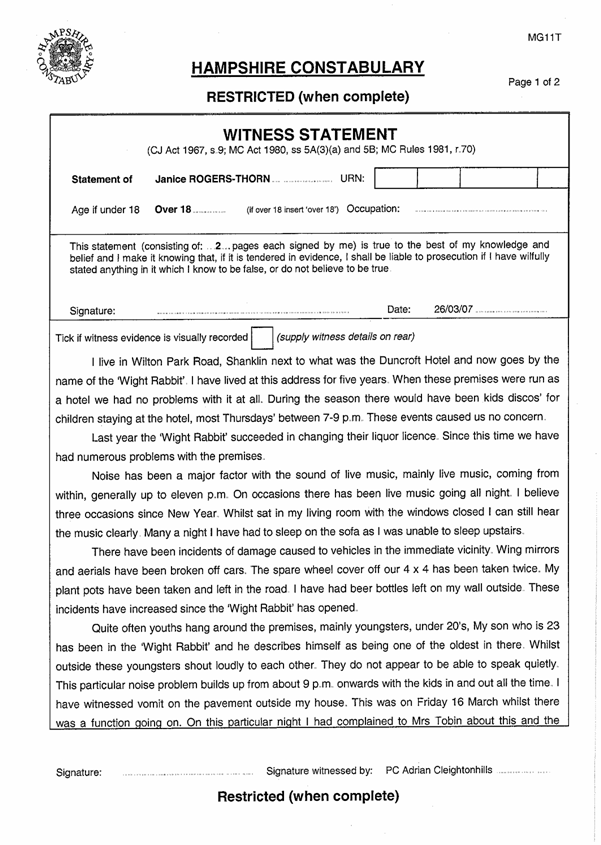
APPENDIX
2
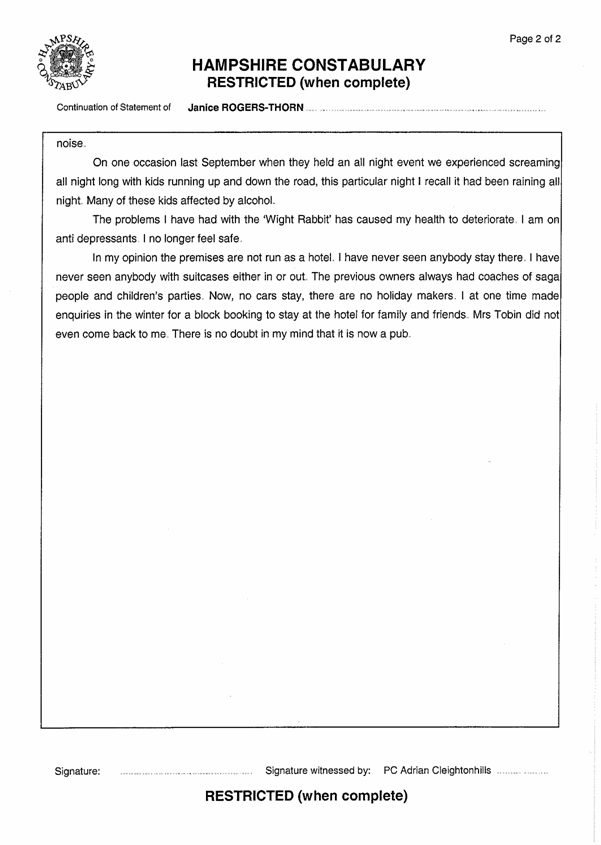
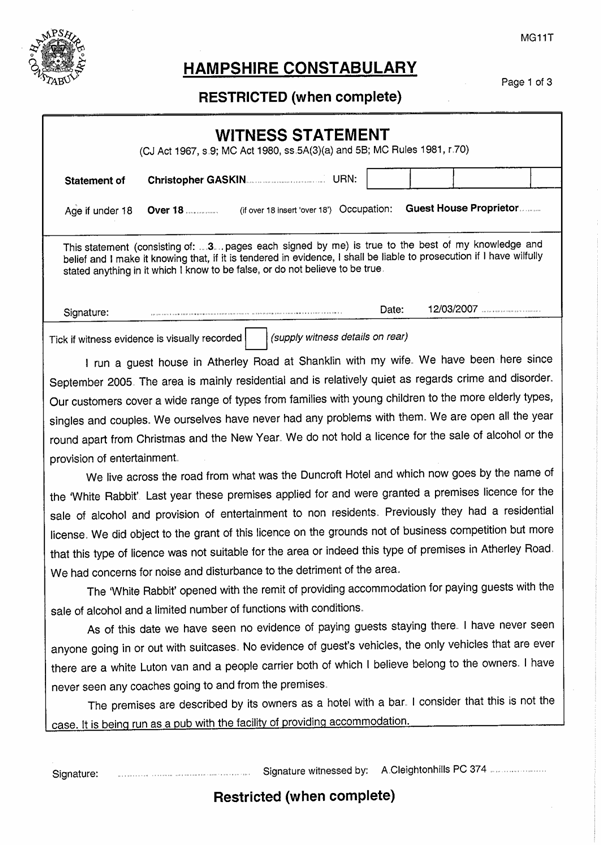
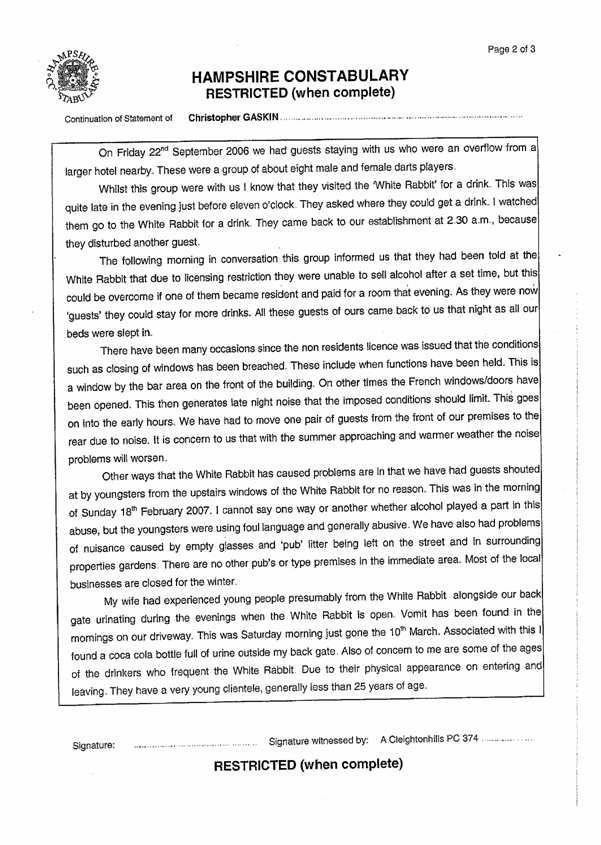
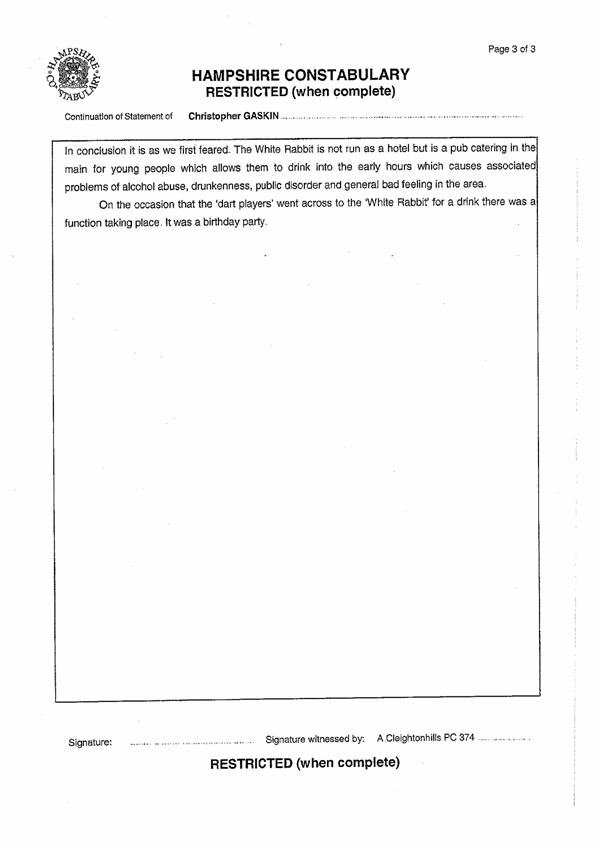
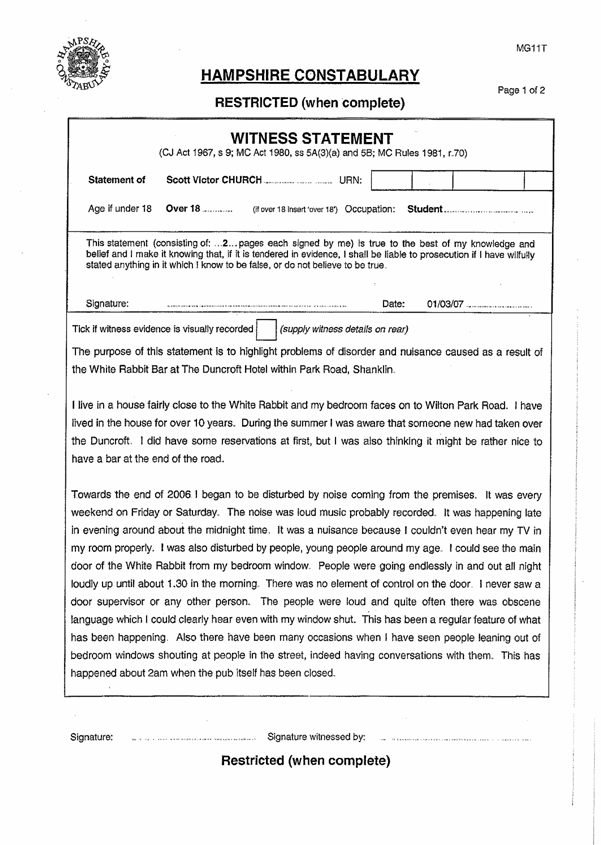
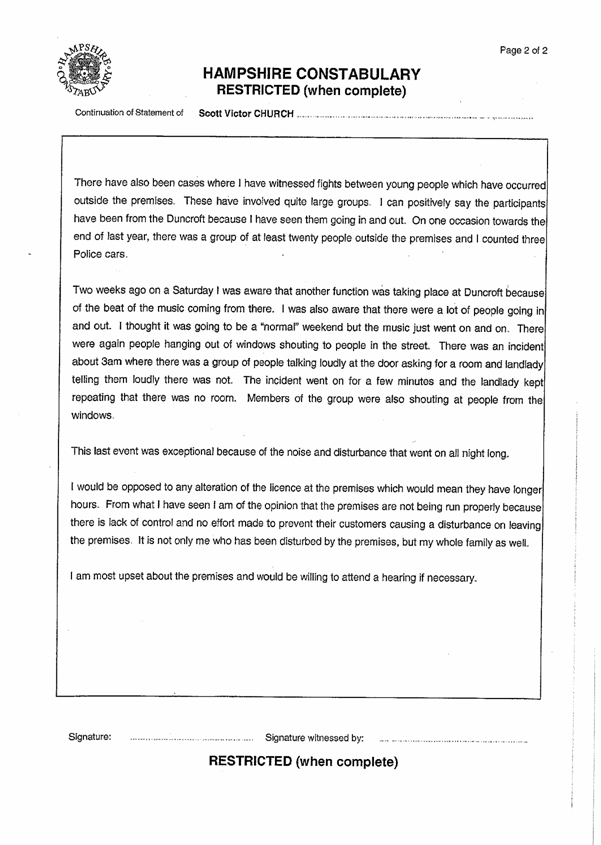
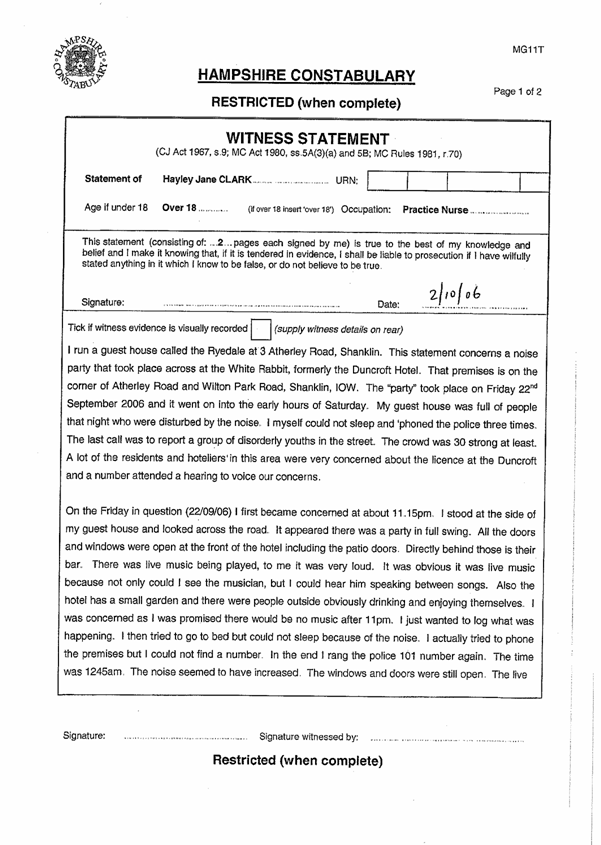

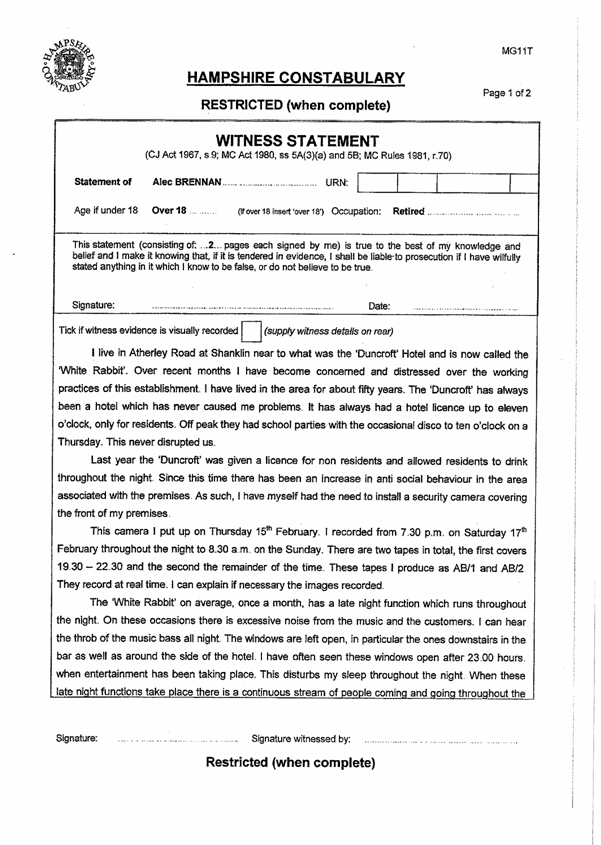
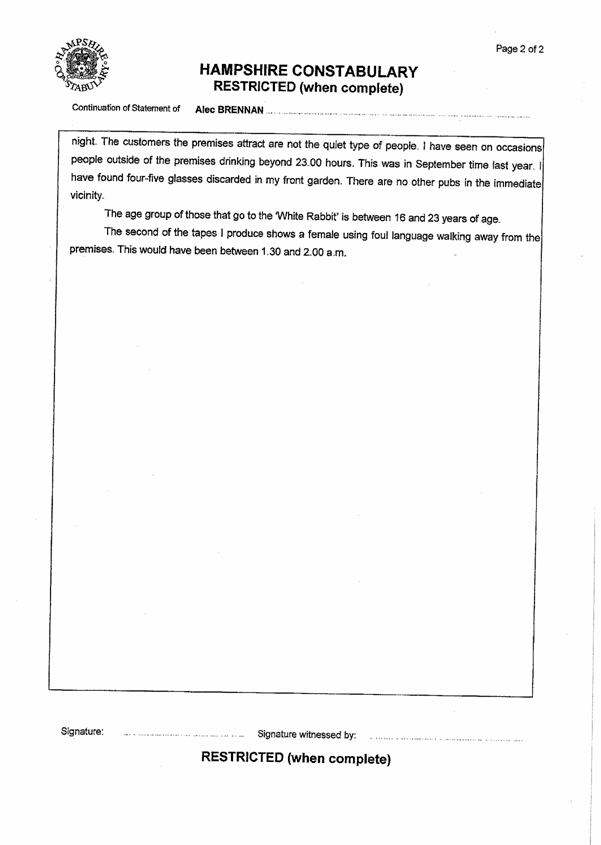
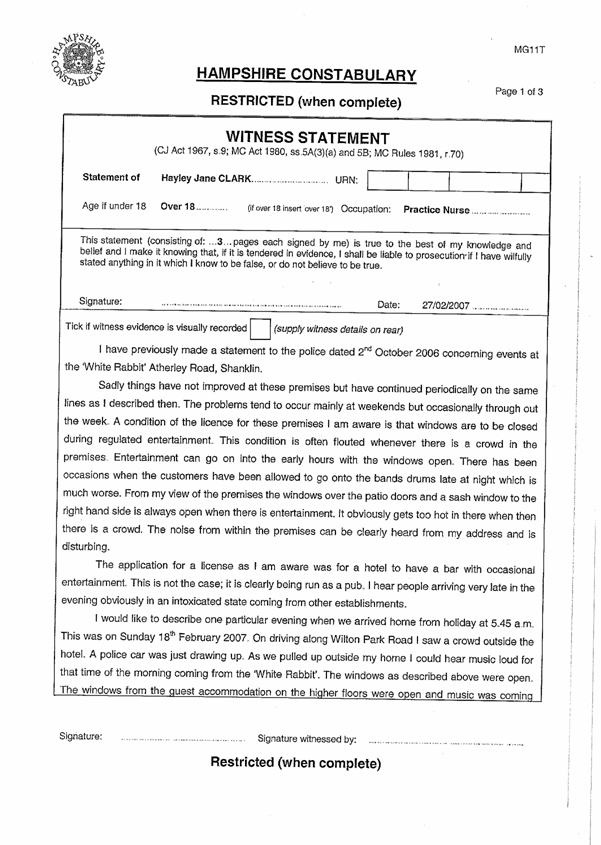
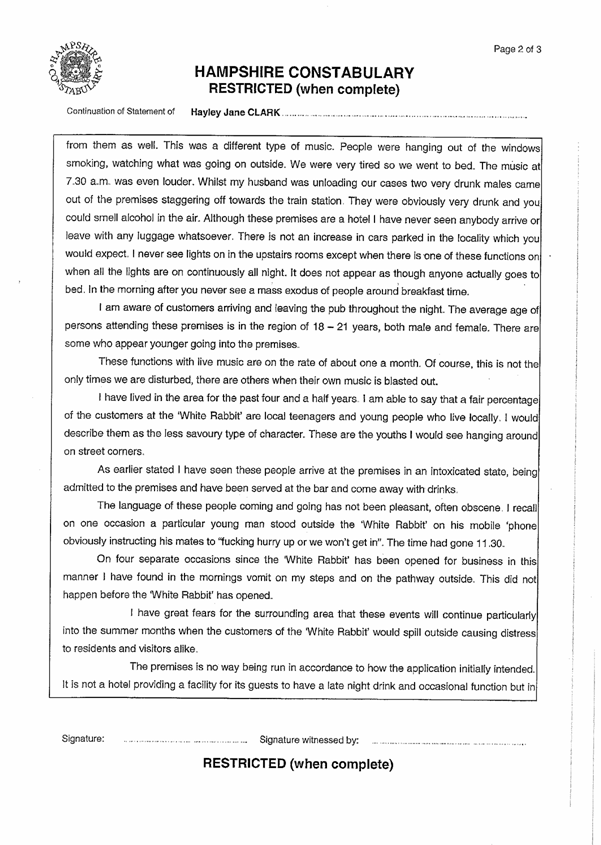
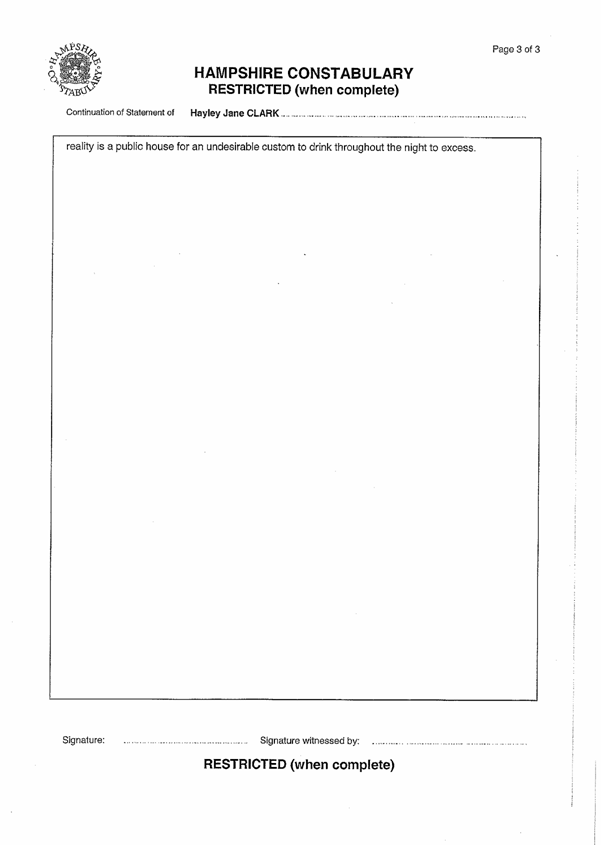
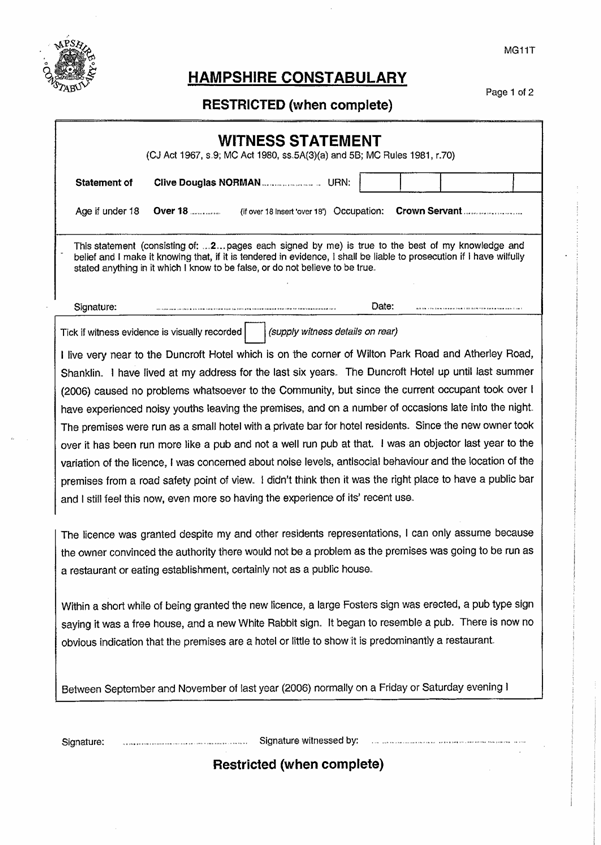
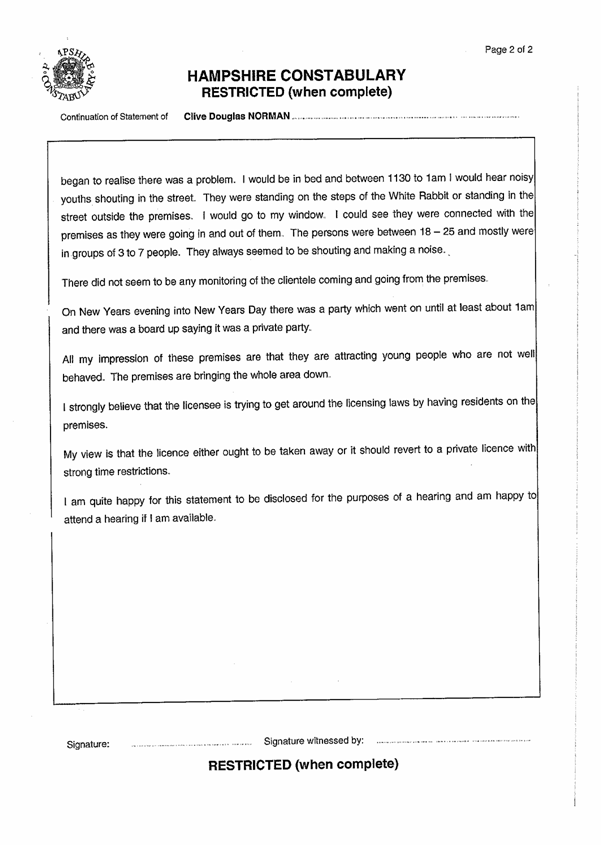

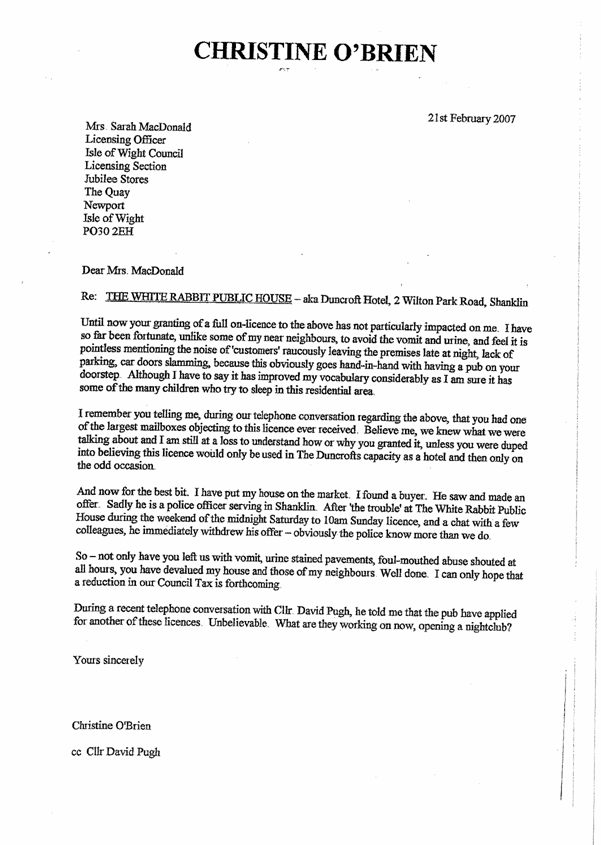
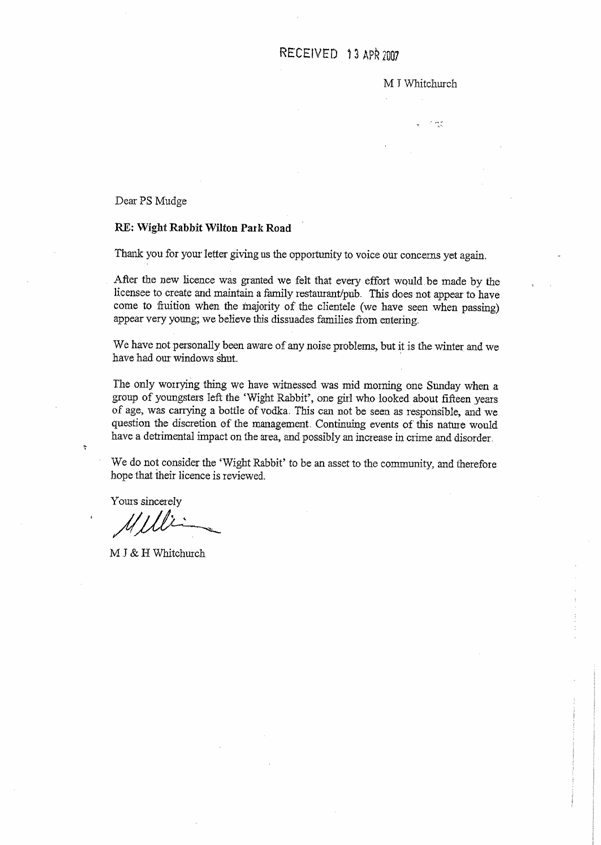
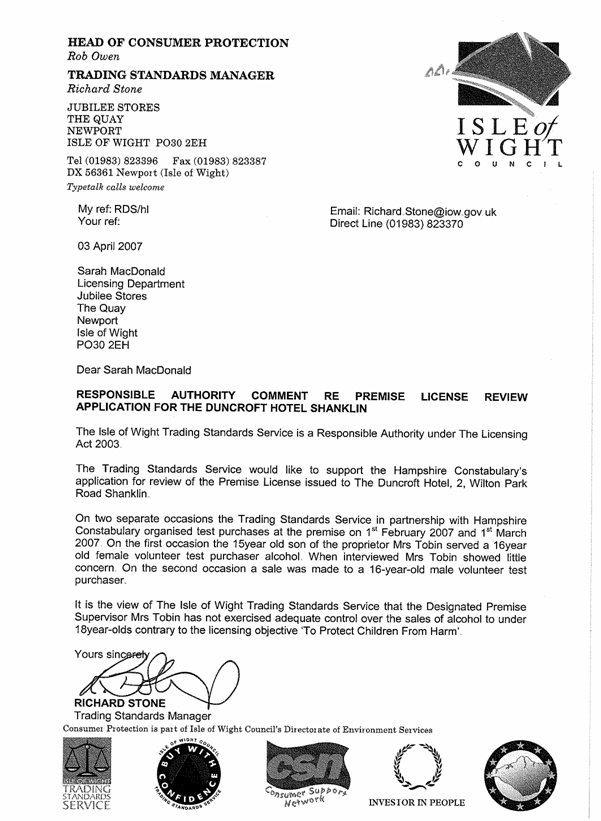
APPENDIX
3
APPENDIX 4
Premises Licence Number:
IW 010822
Ms Gillian Mary Tobin
Duncroft Hotel
Shanklin
PO37 7BT
Licensable Activities Authorised by the Licence
|
Licensable Activity |
Permitted Hours |
|
|
|
|
Live Music (on not more than 15 occasions per year) |
All days 1000hrs to 2400hrs |
|
|
|
|
Recorded Music |
Monday to Saturday 1000hrs to 2400hrs Sunday 1200hrs to 2300hrs (2400hrs when one of the 15 occasions with live music) |
|
|
|
|
Performances of Dance |
Monday to Saturday 1000hrs to 2400hrs Sunday 1200hrs to 2300hrs (2400hrs when one of the 15 occasions with live music) |
|
|
|
|
Supply of Alcohol |
All days 1000hrs to 2400hrs 24 hrs for residents only |
|
|
|
|
Opening Hours of Premises |
All days1000hrs to 2400hrs 24 hrs for residents only |
The certificate authorises the supply of alcohol for consumption on and
off the premises
Full Name
Address, postcode, telephone number of holder of premises licence
Mrs Gillian Mary Tobin, Duncroft Hotel,
PO37 7BT (01983) 862427
Registered number of holder
N/A
Name, full address, postcode, telephone number of designated premises
Supervisor
Mrs Gillian Tobin, Duncroft Hotel,
PO37 7BT (01983) 862427
Personal Licence Number and issuing authority of personal licence held
by designated premises supervisor
IW 014734
ISLE OF WIGHT COUNCIL
Jubilee Stores
The Quay
PO30 2EH
Premises Licence
Number
IW 010822
Annex 2
Conditions consistent with the operating Schedule
1.
No
regulated entertainment shall take place outside.
2.
Alcohol
shall not be consumed in the outside area of the premises after 2300hrs.
3.
Suitable
beverages other than intoxicating liquor (including drinking water) shall be
equally available for consumption with or otherwise as an ancillary to meals
served in the licensed premises.
ISLE OF WIGHT COUNCIL
Jubilee Stores
The Quay
PO30 2EH
Premises Licence
Number
IW 010822
Annex 3
Conditions attached
after a hearing by the
4.
Windows
to be closed at 2200hrs during regulated entertainment.
5.
Live
music to be restricted to 15 times per year.
6.
No
regulated entertainment to take place after 2300hrs on Sundays except in
relation to the 15 occasions during the year referred to in condition (5)
above, the applicant to give the
ISLE OF WIGHT COUNCIL
Jubilee Stores
The Quay
PO30 2EH
Premises Licence
Number
IW 010822
Annex 4
Plans
